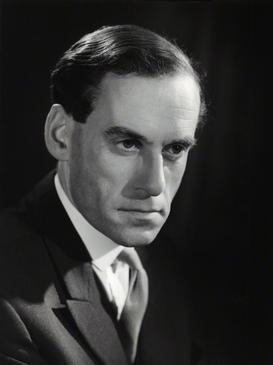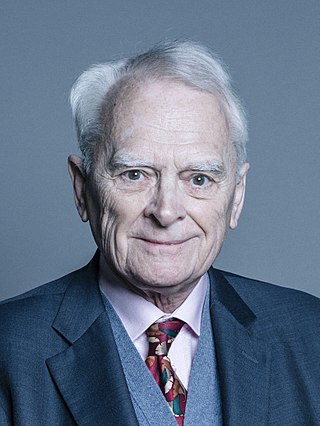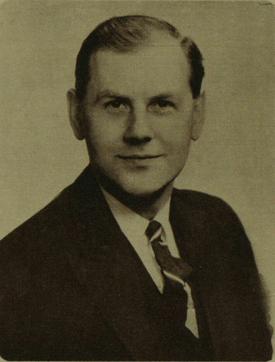
Joseph Grimond, Baron Grimond, was a British politician, leader of the Liberal Party for eleven years from 1956 to 1967 and again briefly on an interim basis in 1976.

David Martin Scott Steel, Baron Steel of Aikwood, is a retired Scottish politician. Elected as Member of Parliament for Roxburgh, Selkirk, and Peebles, followed by Tweeddale, Ettrick, and Lauderdale, he served as the final leader of the Liberal Party, from 1976 to 1988. His tenure spanned the duration of the alliance with the Social Democratic Party, which began in 1981 and concluded with the formation of the Liberal Democrats in 1988.

John Jeremy Thorpe was a British politician who served as the Member of Parliament for North Devon from 1959 to 1979, and as leader of the Liberal Party from 1967 to 1976. In May 1979 he was tried at the Old Bailey on charges of conspiracy and incitement to murder his ex-boyfriend Norman Scott, a former model. Thorpe was acquitted on all charges, but the case, and the furore surrounding it, ended his political career.

Robert Adam Ross "Bob" Maclennan, Baron Maclennan of Rogart, was a British Liberal Democrat politician and life peer.

William Thomas Rodgers, Baron Rodgers of Quarry Bank, is a British politician and life peer. As a Labour Party member of Parliament, he served as Secretary of State for Transport from 1976 to 1979, and was one of the "Gang of Four" of senior Labour politicians who defected to form the Social Democratic Party (SDP). He subsequently helped to lead the SDP into the merger that formed the Liberal Democrats in 1988, and later served as the party's leader in the House of Lords between 1997 and 2001.
Young Liberals is the youth and student organisation of the British Liberal Democrats. Membership is automatic for members of the Liberal Democrats aged under 30. It organises a number of Fringe events at the Liberal Democrat Conference, which is held twice each year.

Glasgow University Union (GUU) is one of the largest and oldest students' unions in the UK, serving students and alumni of the University of Glasgow since 1885.

Edmund Emanuel Dell was a British politician and businessman. He was a Labour MP and minister in the 1960s and 1970s, but after leaving parliament, joined the Social Democratic Party and its eventual successor, the Liberal Democrats.
Oxford University Labour Club (OULC), was founded in 1919 to promote democratic socialism and is today the home of the Labour Party and of social democracy at Oxford University. The club caters for any students who are interested in the ideals of the labour movement whether members of the Labour Party or entirely new to politics. Stewart Wood, special adviser to consecutive Labour Party leaders Gordon Brown and Ed Miliband, said that 'OULC is held up as an exemplar of what needs to be done.' During his visit to Oxford in July 2009 the Prime Minister Gordon Brown was reported as having praised OULC's 'brilliant contribution to progressive politics in the University, the city and the country.' The club was instrumental in returning Andrew Smith to Parliament for Oxford East at the 2010 General Election with a 4.1% swing to Labour, the largest in England outside London.

Cambridge University Liberal Association (CULA) is the student branch of the Liberal Democrats for students at Cambridge University.
The Cambridge University Labour Club (CULC), formerly known as Cambridge Universities Labour Club, is a student political society, first founded as the Cambridge University Fabian Society, intended to provide a voice for the British Labour Party at the University of Cambridge. Serving as the largest student Labour society in Britain, it has gained recognition as an active campaigning force in the labour movement.

Hugh Emlyn Hooson, Baron Hooson, was a Welsh Liberal and then Liberal Democrat politician. He was the Member of Parliament (MP) for Montgomeryshire from 1962 until 1979.
Beatrice Nancy Seear, Baroness Seear was a British social scientist and politician. She was leader of the Liberal Party in the House of Lords from 1984 to 1988, and Deputy Leader of the Liberal Democrats in the House of Lords from 1988 to 1997. She was also appointed a Privy Counsellor in 1985.
National League of Young Liberals (NLYL), often just called the Young Liberals, was the youth wing of the British Liberal Party. It was in existence from 1903 to 1990. Together with the party's student wing, the Union of Liberal Students (ULS), the organisations made up the Young Liberal Movement. In 1988, the ULS merged with the Social Democratic Party's own student wing, and in 1990 the youth and student sections themselves merged to form Liberal Democrat Youth and Students (LDYS). It was renamed Liberal Youth in Spring 2008, and then as Young Liberals in December 2016. The NLYL played a significant role in the development of Liberal thought and action, particularly from the 1960s until the end of the 1980s.

The Liberal Democrats are a liberal political party in the United Kingdom, founded in 1988. They are based at Liberal Democrat Headquarters, near Westminster, and the current leader of the party is Ed Davey. They are the third-largest party in the United Kingdom, with 72 members of Parliament (MPs) in the House of Commons. They have 78 members of the House of Lords, four members of the Scottish Parliament, one member in the Welsh Senedd, and more than 3,000 local council seats. The party holds a twice-per-year Liberal Democrat Conference, at which party policy is formulated. In contrast to its main opponents' rules, the Liberal Democrats grant all members attending its Conference the right to vote on party policy, under a one member, one vote system. The party also allows its members to vote online for its policies and in the election of a new leader.
The Oxford University Liberal Club (OULC) was a student political club at the University of Oxford from 1913 to 1987. Initially formed from clubs called the Russell Club and the Palmerston Club, in its early years it also occupied premises in Oxford and acted as a gentlemen's club.
Philip George Watkins was an English accountant and Liberal Party politician. He was for many years treasurer of the Liberal Party. During the 1970s, he had to endure both the spotlight of the media during the Jeremy Thorpe affair and an investigation into the finances of the party under Thorpe's leadership.
The Oxford University Conservative Association (OUCA) is a student Conservative association founded in 1924, whose members are drawn from the University of Oxford. Since October 2009, OUCA has been affiliated with Conservative Future and its successor, the Young Conservatives, the Conservative Party youth wing.

The Social Democratic Party (SDP) was a centrist to centre-left political party in the United Kingdom. The party supported a mixed economy, electoral reform, European integration and a decentralised state while rejecting the possibility of trade unions being overly influential within industrial relations. The SDP officially advocated social democracy, and unofficially for social liberalism as well.

A Question of Europe was a televised debate of the Oxford Union held on 3 June 1975. The debate was held two days before the 1975 referendum, in which the electorate were asked if Britain should remain a member of the European Economic Community (EEC) which it had joined in 1973. The statement debated was "that this House would say yes to Europe". Former prime minister Edward Heath and the leader of the Liberal Party Jeremy Thorpe spoke in favour of the motion and Labour ministers Barbara Castle and Peter Shore spoke against it. Heath judged that the audience were largely in favour of the motion anyway and in the vote after the debate, the statement was approved by 493 votes to 92. The debate was broadcast live on BBC1 with an introduction by Robin Day and Ludovic Kennedy; at the end of the programme David Dimbleby provided an update on other developments in the referendum campaign. The result of the 5 June referendum was 67% in favour of remaining within the EEC.












